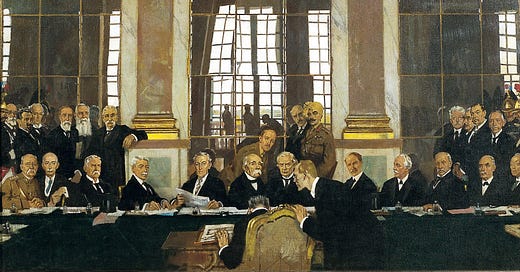Lessons From Versailles
The power of compromise on the stage of international politics
On 28 June 1919, in the French city of Versailles, Germany and the Allied powers signed a peace treaty that officially ended the First World War. Yet this was a strange treaty indeed: Germany was not allowed to participate in the treaty negotiations but faced harsh terms it had no chance to challenge. Territorial concessions, reparations, putting their head of state on trial and more were leveled against Germany, punishing it as brutally as possible for the war it started. That troublemaker nation would never rise up again, thought the Allies.
Not even twenty years later, Germany would kick off the even bloodier Second World War.
In the light of the complexity of events surrounding these wars, it’s certainly a stretch to say that the Treaty of Versailles was the reason for the Germans once again ending up at loggerheads with the world. Most notably, there were follow-up treaties and negotiations such as the Locarno Treaties that aimed to reduce the severity of punishments against Germany and improve its relations with the Allies. But no doubt, there was a great deal of dissatisfaction and rage stirred up amongst the population. Their economy was devastated and their national pride was wounded by external powers, ideal breeding grounds for the ultranationalism and xenophobia that Hitler tapped on to rise to power.
What went wrong, and how have nations since then tried to learn from these mistakes?
One word: compromise.
Over the long history of human civilisations, there has been an apparent trend of power eventually being concentrated in the hands of a single power. From the Roman empire dominating Europe to the Incan rule of South America, even up till the modern day with power being concentrated in the hands of the two greatest superpowers of the modern day, the United States and China. Such a power system is what led to the Allied superpowers, rising in political influence in the wake of the Great War, being able to exert such unforgiving and unilateral measures against Germany.
Yet it was precisely such concentration of power that stirred up the (justified!) feeling of unfairness and resentment amongst Germans, worsening the postwar attitude towards the Allies and fostering conditions that allowed the rise of Hitler. Though it is true that the concentration of power in one or a few superpowers remains the norm today, and even though such powers are capable of unilaterally asserting their power and influence over another without compromise, there is a greater ideal of creating multilateral equity and compromise in discussions and agreements, providing smaller nations the ability to speak up against arm-twisting and push for their own interests.
Organizations such as the Non-aligned Movement have sprung up to counter the traditional uni- or bilateral power distribution in the global or regional scales. allowing each nation to voice out their own concerns on equal grounds with superpowers and fight for agreements that benefit themselves and not just the powers that be. Even organizations like the United Nations are established with the aim of ensuring that compromises are possible, that international negotiations can happen on an equal footing regardless of power status, and that the horrors that descended from Versailles never happen again.
Of course, not everything is perfect. Even in multilateral groupings like the United Nations Security Council or the Group of 20, permanent members (who have significantly more power and influence) enjoy far more privileges than guest members, for the latter can be vetoed or lack formal representation in the decision-making process. For example, in the G20, guest invitees have significantly less say in the final decision as the priority is to reach consensus amongst members and not guests. Nonetheless, it is arguable that the G20 still reflects the changed attitude of the world towards power: no longer do the interests of superpowers alone prevail, but rather there is a renewed focus on weaker countries such as those found in the global south.
More recently, the war in Gaza has prompted a series of proposals for ceasefires, yet even as talks about such a ceasefire are ongoing there seems to be little hope for any conclusive peace in the region. Prejudice and hatred, which have fuelled a great deal of rhetoric on both sides of this conflict that has arisen from deep in the past and persisted till now, make it seem like there is no compromise in sight for Israel and Palestine. So while Versailles has taught us a vital lesson here, there are its limits too.
The lessons we have learnt from Versailles were hardly a miracle. We do not see complete equity or multilateralism today, and the same hatred that drove the Allies to try and subdue Germany forever still pushes the nations of today to destroy one another. But perhaps what is important is not that these lessons change the world overnight, or even in a long time, but rather that we are aware of these missteps in the past and take a different worldview.
Yes, power politics still drive much of the world. But as the G20 and other such avenues of multilateral cooperation have proven, there are those who have taken these lessons to heart.
And perhaps, they might just be able to change the world for the better.
Bibliography
Britannica. “Treaty of Versailles | Definition, Summary, Terms, & Facts.” In Encyclopedia Britannica, October 25, 2018. https://www.britannica.com/event/Treaty-of-Versailles-1919.
F. Jeffrey , James. “The Gaza Ceasefire Proposal Could Still Resolve the Israel-Hamas Conflict.” Wilson Center, 2024. https://www.wilsoncenter.org/article/gaza-ceasefire-proposal-could-still-resolve-israel-hamas-conflict.



